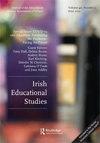Exploring Irish primary school children’s perceptions of themselves as learners in preparation for the key competency of ‘being an active learner’ within the Primary Curriculum Framework
IF 1.2
4区 教育学
Q2 EDUCATION & EDUCATIONAL RESEARCH
引用次数: 0
Abstract
In March 2023, the Department of Education published the ‘Primary Curriculum Framework’ for primary and special schools in Ireland. Reflecting trends in international curriculum reform centred on the needs and priorities of twenty-first century learning and life, the Framework proposes a set of seven key competencies which are presented to underpin children’s learning and development during their time in primary school. In this paper, we focus on one such key competency, ‘being an active learner.’ We aspire to theoretically conceptualise this key competency in relation to the psychological constructs of ‘learner identity’ and ‘learning to learn.’ We argue that such a conceptualisation must not only reflect the cognitive and metacognitive ‘how’ of learning, but also the affective ‘who’ of the learner. Arising from this, we explore Irish primary school children’s perceptions of themselves as learners, drawing on 188 children’s open-ended descriptions of themselves as learners and 136 online survey responses to the ‘Myself-As-Learner Scale’ (MALS). Despite a majority of children describing themselves as learners in positive terms, findings indicate that Irish primary school children report lower mean MALS scores than standardisation data for the scale, with statistically significant differences revealed between genders and class levels. Implications for policy and practice are discussed, as well as opportunities associated with the key competency if meaningfully realised.探索爱尔兰小学生对自己作为学习者的看法,为小学课程框架内“积极学习者”的关键能力做准备
2023年3月,教育部公布了爱尔兰小学和特殊学校的“小学课程框架”。该框架反映了以21世纪学习和生活的需求和优先事项为中心的国际课程改革的趋势,提出了一套七项关键能力,以支持儿童在小学期间的学习和发展。在本文中,我们关注的是一个关键的能力,“成为一个积极的学习者”。“我们希望从理论上将这一关键能力与‘学习者身份’和‘学会学习’的心理结构联系起来。”“我们认为,这种概念化不仅必须反映学习的认知和元认知'如何',还必须反映学习者的情感'谁'。”基于此,我们研究了爱尔兰小学生对自己作为学习者的看法,利用188名儿童对自己作为学习者的开放式描述和136份对“自我作为学习者量表”(MALS)的在线调查回应。尽管大多数儿童以积极的方式描述自己是学习者,但研究结果表明,爱尔兰小学生报告的平均MALS分数低于该量表的标准化数据,性别和班级水平之间存在统计学上的显著差异。讨论了对政策和实践的影响,以及与关键能力相关的机会,如果有意义地实现。
本文章由计算机程序翻译,如有差异,请以英文原文为准。
求助全文
约1分钟内获得全文
求助全文

 求助内容:
求助内容: 应助结果提醒方式:
应助结果提醒方式:


